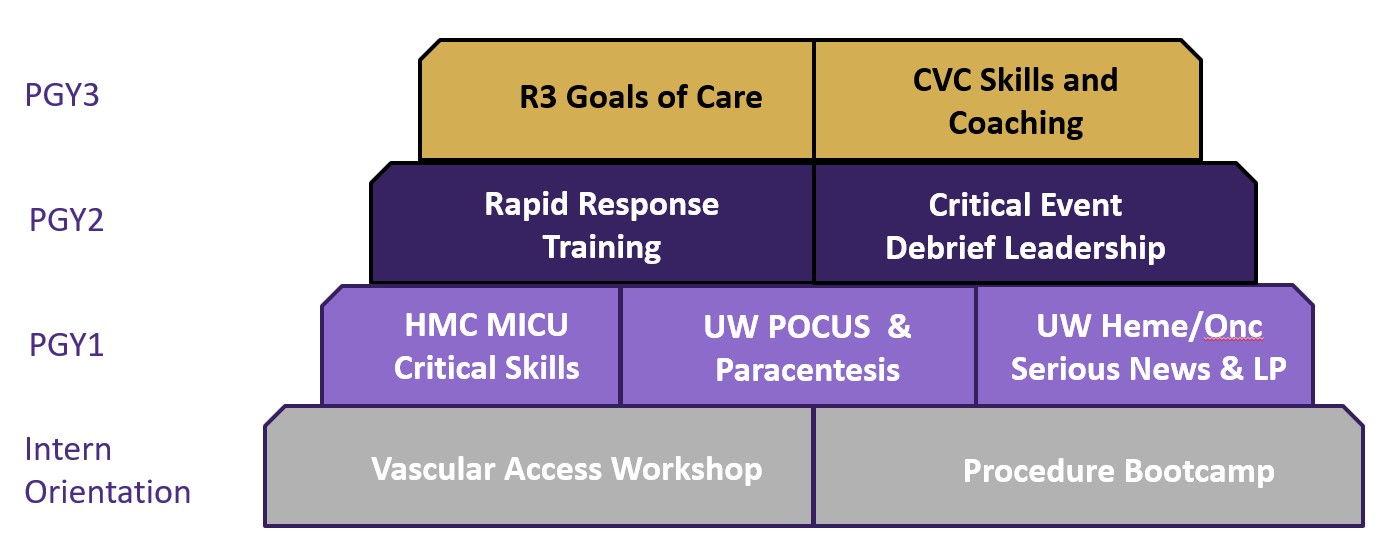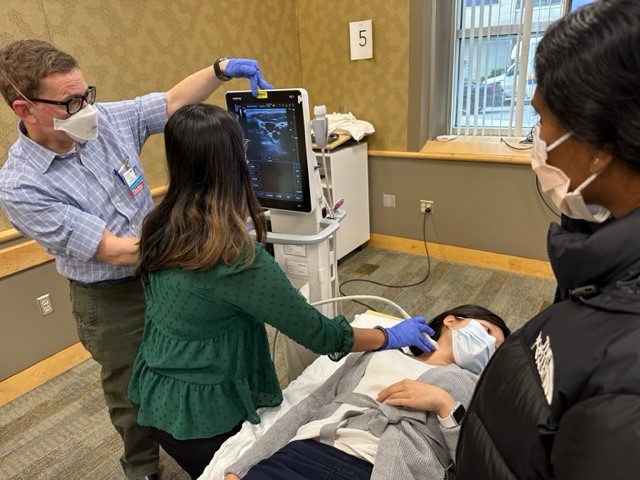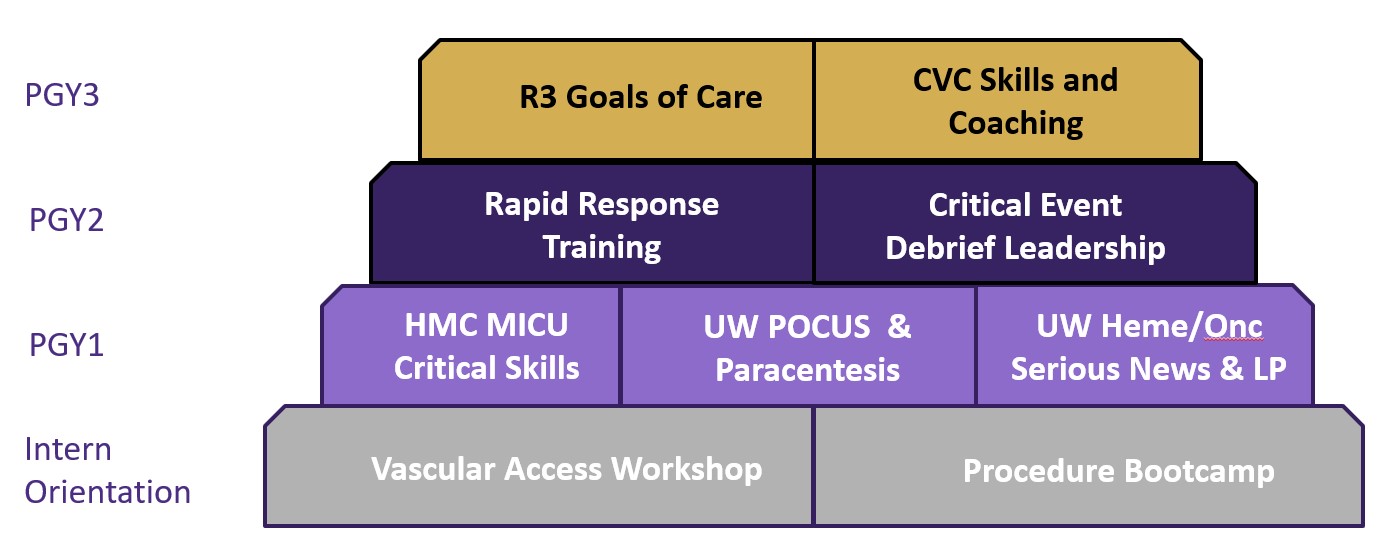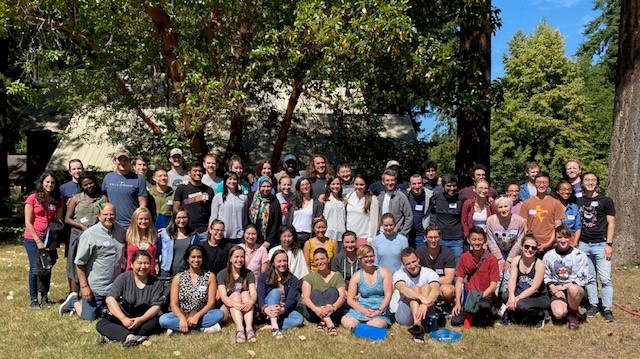Teaching Conferences
Teaching activities occur throughout each day. In addition to inpatient attending rounds and outpatient precepting, our program curriculum includes:
 Academic Half-Day
Academic Half-Day
Thursday mornings, September through June, all residents on non-admitting rotations are scheduled for these half-day teaching conferences. Session topics vary, but include MKSAP-style board reviews, interactive small group teaching, and skill-building workshops. Many of the conferences are thematically linked together within a given half-day session.

- Board Prep Conference
Weekly lunchtime conference series covering essentail core internal medicine topics.
- Chief of Medicine Conference
Interactive presentation with rotating topics including inpatient and outpatient cases and Morbidity and Mortality review sessions.
- Intern Core Conference
Chief resident-led interactive case presentation and
discussion for interns, with graduated complexity as the year progresses.
- Intern Teaching Conference
A case-based teaching series specifically designed for Medicine R1s, held weekly from July to August. These lectures are intended to ease the transition to the wards and intensive care units for new interns and to provide practical guidelines for the management of basic patient care issues. All interns are excused from clinical duties to attend.
- Medicine Grand Rounds
Topics ranging from cutting edge research to discussions of healthcare delivery are presented by local and visiting speakers to an audience of housestaff, faculty, and community providers.
- Morning Report
Chief resident-led interactive case presentation and discussion, primarily focused on clinical reasoning and management of recently admitted patients
- Senior Report
Chief resident-led interactive case presentation and discussion for senior residents of a “cold case” from the previous night, primarily focused on management decisions and teaching points to share with interns and medical students.
- Patients, Physicians, and Community
This weekly course takes place throughout the later portion of intern year duing outpatient rotations. The course explores the intersection of medicine, social determinants of health, and "real life," and includes in-depth examination into some of the more emotional aspects of the work we do every day. There are three broad topic areas we pursue:- Humanities in medicine, self-care, and well-roundedness of the physician and trainee.
- Seeing vulnerable patients in other settings (methadone clinic, homeless shelter, prison and jail).
- Death and end-of-life care, communication, and difficult conversations.
Courses & Workshops
In addition to the weekly conferences listed above, there are many educational activities scheduled throughout the academic year. These include:
- Just-in-Time Workshops
Experiential small group learning to provide critical skills adjacent to delivery span the R1-R3 years.

| Rotation | Level(s) | Skills |
|---|---|---|
| Orientation | R1 |
Declaring a death |
| Harborview Medicine | R2/R3 | Debriefing serious events |
| Harboview MICU | R1 | Leading family meetings Thoracentesis Central venous catheter (CVC) refresher |
| Harboview MICU & CCU | R3 | CVC coaching CVC skill refresher |
| UWMC-Montlake Heme/Onc | R1 | Delivering serious news Lumbar puncture |
| UWMC-Montlake Medicine | R1 | POCUS Paracentesis refresher |
| UWMC-Montlake Medicine | R3 | Patient centered goals of care |
- Resident as Teacher Leader
In early July, all R2s are brought together for a comprehensive full-day workshop designed to empower residents in their roles as teachers and team leaders. Large group didactics are interspersed with small group breakouts and self-refection.

- Experiential Quality Improvement Project (EQuIP)
A four-week intermediate-level introduction to QI concepts. R2s simulate a root cause analysis of an actual patient safety event, develop a responsive quality improvement project, and present their findings and proposed interventions to hospital executives.
-
Health Equity, Advocacy, and Anti-Racism (HEAAR)
A comprehensive, multitiered, and interprofessional curricular thread embedded into the residency program with the goal of learning principles of anti-oppression and using those frameworks to understand and address the structural origins of health inequities. Given the many ways that medicine historically and presently has perpetuated racism and health inequities, it is our professional obligation to rebuild the broken trust with affected communities and to train and empower residents to advocate for health equity within the communities they serve. -
R1 Professional Development: Maximizing My Education
Held in late October the “Maximizing My Education” event covers a broad range of topics to include mentorship and RAMP, pathways, WWAMI opportunities, research opportunities, the GROW model, and schedule logistics.
- Career Explorations
Held mid-winter, all R2s are brought together for a six-hour workshop allowing exposure to different career paths, and covering such topics as CV and portfolio refinement, interviewing and negotiating skills, lifelong learning, and wellness and balance.


